|
SNAP Library 2.2, Developer Reference
2014-03-11 19:15:55
SNAP, a general purpose, high performance system for analysis and manipulation of large networks
|
|
SNAP Library 2.2, Developer Reference
2014-03-11 19:15:55
SNAP, a general purpose, high performance system for analysis and manipulation of large networks
|
#include <xmath.h>
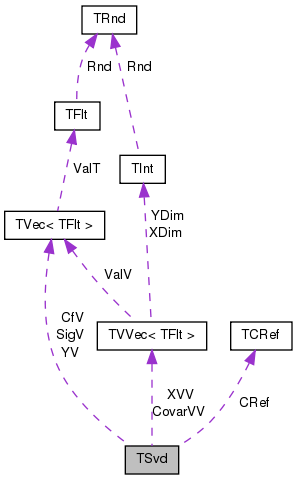
Public Member Functions | |
| void | GetXV (const int RecN, TFltV &VarV) const |
| double | GetY (const int RecN) const |
| double | GetSig (const int RecN) const |
| void | NR_svbksb (TFltVV &u, TFltV &w, TFltVV &v, int m, int n, TFltV &b, TFltV &x) |
| void | NR_svdvar (TFltVV &v, int ma, TFltV &w, TFltVV &cvm) |
| void | NR_svdfit () |
| TSvd () | |
| ~TSvd () | |
| TSvd (TSIn &) | |
| void | Save (TSOut &) |
| TSvd & | operator= (const TSvd &) |
| int | GetRecs () const |
| int | GetVars () const |
| double | GetCf (const int &VarN) const |
| double | GetCfUncer (const int &VarN) const |
| double | GetCovar (const int &VarN1, const int &VarN2) const |
| double | GetChiSq () const |
| void | GetCfV (TFltV &_CfV) |
| void | GetCfUncerV (TFltV &CfUncerV) |
| void | Wr () const |
Static Public Member Functions | |
| static double | NR_SIGN (double a, double b) |
| static double | NR_FMAX (double maxarg1, double maxarg2) |
| static int | NR_IMIN (int iminarg1, int iminarg2) |
| static double | NR_pythag (double a, double b) |
| static void | NR_svdcmp (TFltVV &a, int m, int n, TFltV &w, TFltVV &v) |
| static PSvd | New (const TFltVV &XVV, const TFltV &YV, const TFltV &SigV=TFltV()) |
| static PSvd | Load (TSIn &SIn) |
| static void | Svd (const TFltVV &InMtx, TFltVV &LSingV, TFltV &SingValV, TFltVV &RSingV) |
| static void | Svd1Based (const TFltVV &InMtx1, TFltVV &LSingV, TFltV &SingValV, TFltVV &RSingV) |
Public Attributes | |
| TFltVV | XVV |
| TFltV | YV |
| TFltV | SigV |
| int | Recs |
| int | Vars |
| TFltVV | CovarVV |
| TFltV | CfV |
| double | ChiSq |
Private Attributes | |
| TCRef | CRef |
Friends | |
| class | TPt< TSvd > |
| TSvd::TSvd | ( | ) | [inline] |
| TSvd::~TSvd | ( | ) | [inline] |
| double TSvd::GetCf | ( | const int & | VarN | ) | const [inline] |
| double TSvd::GetCfUncer | ( | const int & | VarN | ) | const [inline] |
| void TSvd::GetCfUncerV | ( | TFltV & | CfUncerV | ) |
Definition at line 1224 of file xmath.cpp.
References TVec< TVal, TSizeTy >::Gen(), GetCfUncer(), and Vars.
{
CfUncerV.Gen(Vars);
for (int VarN=0; VarN<Vars; VarN++){
CfUncerV[VarN]=GetCfUncer(VarN);
}
}

| void TSvd::GetCfV | ( | TFltV & | _CfV | ) |
| double TSvd::GetChiSq | ( | ) | const [inline] |
| double TSvd::GetCovar | ( | const int & | VarN1, |
| const int & | VarN2 | ||
| ) | const [inline] |
| int TSvd::GetRecs | ( | ) | const [inline] |
| double TSvd::GetSig | ( | const int | RecN | ) | const [inline] |
Definition at line 411 of file xmath.h.
Referenced by NR_svdfit().
{return SigV[RecN-1];}

| int TSvd::GetVars | ( | ) | const [inline] |
| void TSvd::GetXV | ( | const int | RecN, |
| TFltV & | VarV | ||
| ) | const [inline] |
Definition at line 406 of file xmath.h.
References TVVec< TVal >::At(), and TVec< TVal, TSizeTy >::Gen().
Referenced by NR_svdfit().


| double TSvd::GetY | ( | const int | RecN | ) | const [inline] |
Definition at line 410 of file xmath.h.
Referenced by NR_svdfit().
{return YV[RecN-1];}

| static PSvd TSvd::Load | ( | TSIn & | SIn | ) | [inline, static] |
Definition at line 937 of file xmath.cpp.
References TVec< TVal, TSizeTy >::Empty(), IAssert, Svd(), and TSvd().
{
PSvd Svd=PSvd(new TSvd());
Svd->XVV=_XVV;
Svd->YV=_YV;
if (_SigV.Empty()){
Svd->SigV.Gen(Svd->YV.Len());
Svd->SigV.PutAll(1);
} else {
Svd->SigV=_SigV;
}
Svd->Recs=Svd->XVV.GetXDim();
Svd->Vars=Svd->XVV.GetYDim();
IAssert(Svd->Recs>0);
IAssert(Svd->Vars>0);
IAssert(Svd->YV.Len()==Svd->Recs);
IAssert(Svd->SigV.Len()==Svd->Recs);
Svd->CovarVV.Gen(Svd->Vars+1, Svd->Vars+1);
Svd->CfV.Gen(Svd->Vars+1);
Svd->NR_svdfit();
return Svd;
}
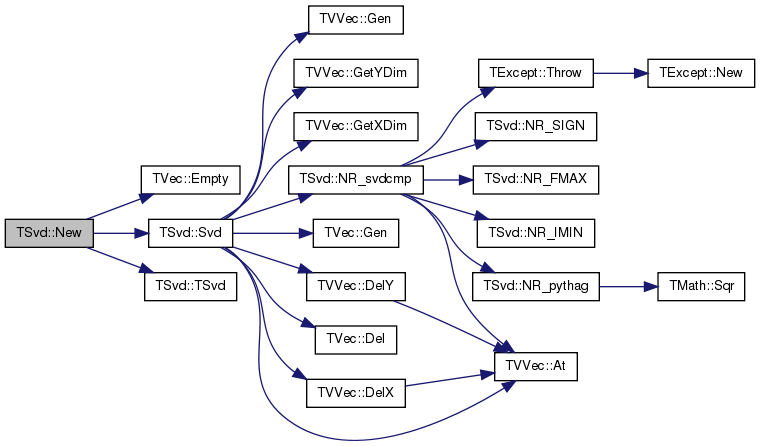
| static double TSvd::NR_FMAX | ( | double | maxarg1, |
| double | maxarg2 | ||
| ) | [inline, static] |
Definition at line 413 of file xmath.h.
Referenced by NR_svdcmp().
{
return maxarg1 > maxarg2 ? maxarg1 : maxarg2;}
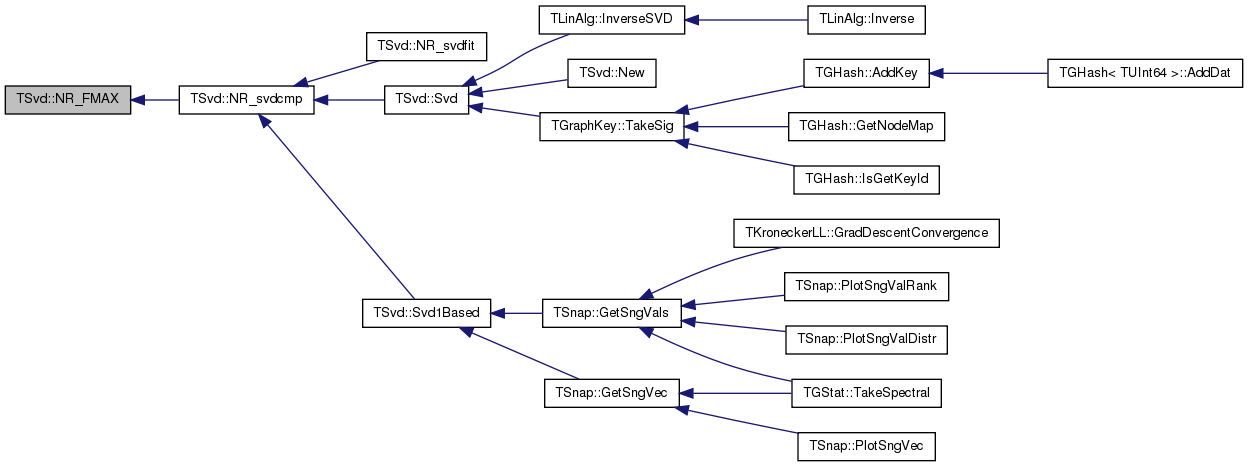
| static int TSvd::NR_IMIN | ( | int | iminarg1, |
| int | iminarg2 | ||
| ) | [inline, static] |
Definition at line 415 of file xmath.h.
Referenced by NR_svdcmp().
{
return iminarg1 < iminarg2 ? iminarg1 : iminarg2;}
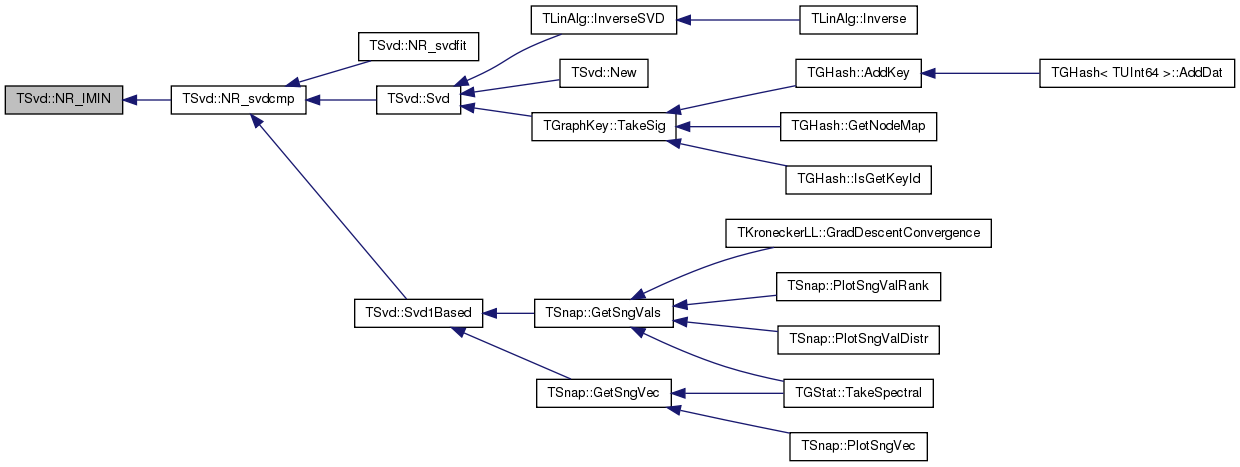
| double TSvd::NR_pythag | ( | double | a, |
| double | b | ||
| ) | [static] |
Definition at line 959 of file xmath.cpp.
References TMath::Sqr().
Referenced by NR_svdcmp().
{
double absa,absb;
absa=fabs(a);
absb=fabs(b);
if (absa > absb){
return absa*sqrt(1.0+TMath::Sqr(absb/absa));
} else {
return (absb == 0.0 ? 0.0 : absb*sqrt(1.0+TMath::Sqr(absa/absb)));
}
}

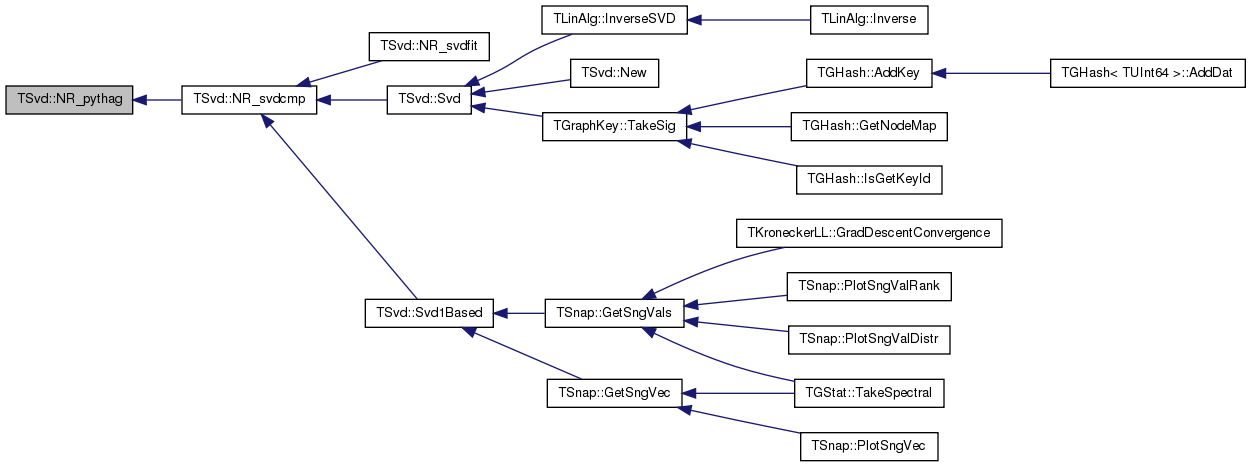
| static double TSvd::NR_SIGN | ( | double | a, |
| double | b | ||
| ) | [inline, static] |
Definition at line 412 of file xmath.h.
Referenced by NR_svdcmp().
{return b >= 0.0 ? fabs(a) : -fabs(a);}
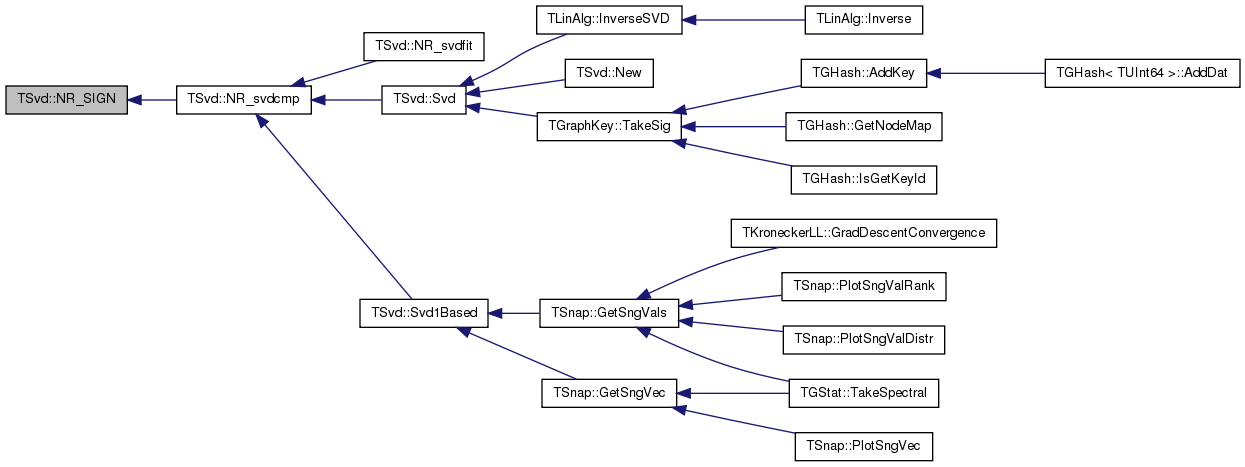
Definition at line 1147 of file xmath.cpp.
References TVVec< TVal >::At().
Referenced by NR_svdfit().
{
int jj,j,i;
double s;
TFltV tmp(n+1);
for (j=1;j<=n;j++) {
s=0.0;
if (w[j]) {
for (i=1;i<=m;i++) s += u.At(i,j)*b[i];
s /= w[j];
}
tmp[j]=s;
}
for (j=1;j<=n;j++) {
s=0.0;
for (jj=1;jj<=n;jj++) s += v.At(j,jj)*tmp[jj];
x[j]=s;
}
}


| void TSvd::NR_svdcmp | ( | TFltVV & | a, |
| int | m, | ||
| int | n, | ||
| TFltV & | w, | ||
| TFltVV & | v | ||
| ) | [static] |
Definition at line 970 of file xmath.cpp.
References TVVec< TVal >::At(), NR_FMAX(), NR_IMIN(), NR_pythag(), NR_SIGN(), and TExcept::Throw().
Referenced by NR_svdfit(), Svd(), and Svd1Based().
{
int flag,i,its,j,jj,k,l=0,nm;
double anorm,c,f,g,h,s,scale,x,y,z;
TFltV rv1(n+1);
g=scale=anorm=0.0;
for (i=1;i<=n;i++) {
l=i+1;
rv1[i]=scale*g;
g=s=scale=0.0;
if (i <= m) {
for (k=i;k<=m;k++) scale += fabs(double(a.At(k,i)));
if (scale) {
for (k=i;k<=m;k++) {
a.At(k,i) /= scale;
s += a.At(k,i)*a.At(k,i);
}
f=a.At(i,i);
g = -NR_SIGN(sqrt(s),f);
h=f*g-s;
a.At(i,i)=f-g;
for (j=l;j<=n;j++) {
for (s=0.0,k=i;k<=m;k++) s += a.At(k,i)*a(k,j);
f=s/h;
for (k=i;k<=m;k++) a.At(k,j) += f*a.At(k,i);
}
for (k=i;k<=m;k++) a.At(k,i) *= scale;
}
}
w[i]=scale *g;
g=s=scale=0.0;
if (i <= m && i != n) {
for (k=l;k<=n;k++) scale += fabs(double(a.At(i,k)));
if (scale) {
for (k=l;k<=n;k++) {
a.At(i,k) /= scale;
s += a.At(i,k)*a.At(i,k);
}
f=a.At(i,l);
g = -NR_SIGN(sqrt(s),f);
h=f*g-s;
a.At(i,l)=f-g;
for (k=l;k<=n;k++) rv1[k]=a.At(i,k)/h;
for (j=l;j<=m;j++) {
for (s=0.0,k=l;k<=n;k++) s += a.At(j,k)*a.At(i,k);
for (k=l;k<=n;k++) a.At(j,k) += s*rv1[k];
}
for (k=l;k<=n;k++) a.At(i,k) *= scale;
}
}
anorm=NR_FMAX(anorm,(fabs(double(w[i]))+fabs(double(rv1[i]))));
}
for (i=n;i>=1;i--) {
if (i < n) {
if (g) {
for (j=l;j<=n;j++)
v.At(j,i)=(a.At(i,j)/a.At(i,l))/g;
for (j=l;j<=n;j++) {
for (s=0.0,k=l;k<=n;k++) s += a.At(i,k)*v.At(k,j);
for (k=l;k<=n;k++) v.At(k,j) += s*v.At(k,i);
}
}
for (j=l;j<=n;j++) v.At(i,j)=v.At(j,i)=0.0;
}
v.At(i,i)=1.0;
g=rv1[i];
l=i;
}
for (i=NR_IMIN(m,n);i>=1;i--) {
l=i+1;
g=w[i];
for (j=l;j<=n;j++) a.At(i,j)=0.0;
if (g) {
g=1.0/g;
for (j=l;j<=n;j++) {
for (s=0.0,k=l;k<=m;k++) s += a.At(k,i)*a.At(k,j);
f=(s/a.At(i,i))*g;
for (k=i;k<=m;k++) a.At(k,j) += f*a.At(k,i);
}
for (j=i;j<=m;j++) a.At(j,i) *= g;
} else for (j=i;j<=m;j++) a.At(j,i)=0.0;
a.At(i,i)++;
}
for (k=n;k>=1;k--) {
for (its=1;its<=30;its++) {
flag=1;
for (l=k;l>=1;l--) {
nm=l-1;
if ((double)(fabs(double(rv1[l])+anorm)) == anorm) {
flag=0;
break;
}
if ((double)(fabs(double(w[nm]))+anorm) == anorm) break;
}
if (flag) {
c=0.0;
s=1.0;
for (i=l;i<=k;i++) {
f=s*rv1[i];
rv1[i]=c*rv1[i];
if ((double)(fabs(f)+anorm) == anorm) break;
g=w[i];
h=NR_pythag(f,g);
w[i]=h;
h=1.0/h;
c=g*h;
s = -f*h;
for (j=1;j<=m;j++) {
y=a.At(j,nm);
z=a.At(j,i);
a.At(j,nm)=y*c+z*s;
a.At(j,i)=z*c-y*s;
}
}
}
z=w[k];
if (l == k) {
if (z < 0.0) {
w[k] = -z;
for (j=1;j<=n;j++) v.At(j,k) = -v.At(j,k);
}
break;
}
if (its==30){
TExcept::Throw("no convergence in 30 svdcmp iterations");}
x=w[l];
nm=k-1;
y=w[nm];
g=rv1[nm];
h=rv1[k];
f=((y-z)*(y+z)+(g-h)*(g+h))/(2.0*h*y);
g=NR_pythag(f,1.0);
f=((x-z)*(x+z)+h*((y/(f+NR_SIGN(g,f)))-h))/x;
c=s=1.0;
for (j=l;j<=nm;j++) {
i=j+1;
g=rv1[i];
y=w[i];
h=s*g;
g=c*g;
z=NR_pythag(f,h);
rv1[j]=z;
c=f/z;
s=h/z;
f=x*c+g*s;
g = g*c-x*s;
h=y*s;
y *= c;
for (jj=1;jj<=n;jj++) {
x=v.At(jj,j);
z=v.At(jj,i);
v.At(jj,j)=x*c+z*s;
v.At(jj,i)=z*c-x*s;
}
z=NR_pythag(f,h);
w[j]=z;
if (z) {
z=1.0/z;
c=f*z;
s=h*z;
}
f=c*g+s*y;
x=c*y-s*g;
for (jj=1;jj<=m;jj++) {
y=a.At(jj,j);
z=a.At(jj,i);
a.At(jj,j)=y*c+z*s;
a.At(jj,i)=z*c-y*s;
}
}
rv1[l]=0.0;
rv1[k]=f;
w[k]=x;
}
}
}
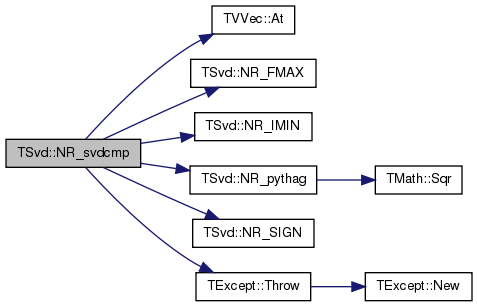
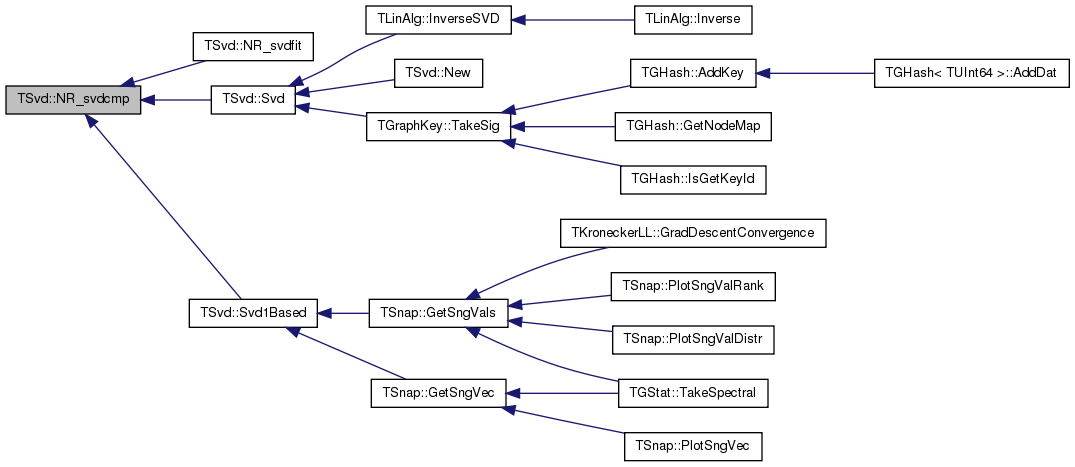
| void TSvd::NR_svdfit | ( | ) |
Definition at line 1185 of file xmath.cpp.
References TVVec< TVal >::At(), CfV, ChiSq, CovarVV, TVVec< TVal >::Gen(), GetSig(), GetXV(), GetY(), NR_svbksb(), NR_svdcmp(), NR_svdvar(), Recs, and Vars.
{
int j,i;
double wmax,tmp,thresh,sum;
double TOL=1.0e-5;
TFltVV u(Recs+1, Vars+1);
TFltVV v(Vars+1, Vars+1);
TFltV w(Vars+1);
TFltV b(Recs+1);
TFltV afunc(Vars+1);
for (i=1;i<=Recs;i++) {
GetXV(i, afunc); // (*funcs)(x[i],afunc,Vars);
tmp=1.0/GetSig(i);
for (j=1;j<=Vars;j++){u.At(i,j)=afunc[j]*tmp;}
b[i]=GetY(i)*tmp;
}
NR_svdcmp(u,Recs,Vars,w,v);
wmax=0.0;
for (j=1;j<=Vars;j++){
if (w[j] > wmax){wmax=w[j];}}
thresh=TOL*wmax;
for (j=1;j<=Vars;j++){
if (double(w[j])<thresh){w[j]=0.0;}}
NR_svbksb(u,w,v,Recs,Vars,b,CfV);
ChiSq=0.0;
for (i=1;i<=Recs;i++) {
GetXV(i, afunc); // (*funcs)(x[i],afunc,Vars);
for (sum=0.0,j=1;j<=Vars;j++){sum += CfV[j]*afunc[j];}
ChiSq += (tmp=(GetY(i)-sum)/GetSig(i),tmp*tmp);
}
// covariance matrix calculation
CovarVV.Gen(Vars+1, Vars+1);
NR_svdvar(v, Vars, w, CovarVV);
}
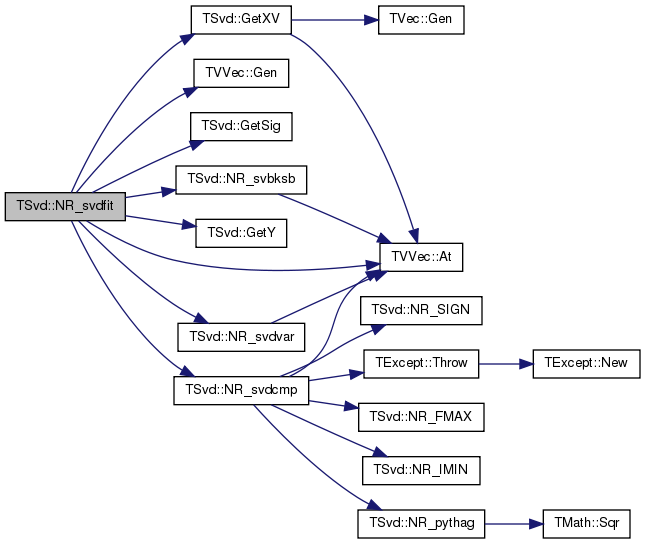
| void TSvd::NR_svdvar | ( | TFltVV & | v, |
| int | ma, | ||
| TFltV & | w, | ||
| TFltVV & | cvm | ||
| ) |
Definition at line 1168 of file xmath.cpp.
References TVVec< TVal >::At().
Referenced by NR_svdfit().
{
int k,j,i;
double sum;
TFltV wti(ma+1);
for (i=1;i<=ma;i++) {
wti[i]=0.0;
if (w[i]) wti[i]=1.0/(w[i]*w[i]);
}
for (i=1;i<=ma;i++) {
for (j=1;j<=i;j++) {
for (sum=0.0,k=1;k<=ma;k++) sum += v.At(i,k)*v.At(j,k)*wti[k];
cvm.At(j,i)=cvm.At(i,j)=sum;
}
}
}


| void TSvd::Save | ( | TSOut & | ) | [inline] |
| void TSvd::Svd | ( | const TFltVV & | InMtx, |
| TFltVV & | LSingV, | ||
| TFltV & | SingValV, | ||
| TFltVV & | RSingV | ||
| ) | [static] |
Definition at line 1232 of file xmath.cpp.
References TVVec< TVal >::At(), TVec< TVal, TSizeTy >::Del(), TVVec< TVal >::DelX(), TVVec< TVal >::DelY(), TVec< TVal, TSizeTy >::Gen(), TVVec< TVal >::Gen(), TVVec< TVal >::GetXDim(), TVVec< TVal >::GetYDim(), and NR_svdcmp().
Referenced by TLinAlg::InverseSVD(), New(), and TGraphKey::TakeSig().
{
//LSingV = InMtx;
LSingV.Gen(InMtx.GetYDim()+1, InMtx.GetYDim()+1);
// create 1 based adjacency matrix
for (int x = 0; x < InMtx.GetXDim(); x++) {
for (int y = 0; y < InMtx.GetYDim(); y++) {
LSingV.At(x+1, y+1) = InMtx.At(x, y);
}
}
RSingV.Gen(InMtx.GetYDim()+1, InMtx.GetYDim()+1);
SingValV.Gen(InMtx.GetYDim()+1);
TSvd::NR_svdcmp(LSingV, InMtx.GetXDim(), InMtx.GetYDim(), SingValV, RSingV);
// 0-th singular value/vector is full of zeros, delete it
SingValV.Del(0);
LSingV.DelX(0); LSingV.DelY(0);
RSingV.DelX(0); RSingV.DelY(0);
}
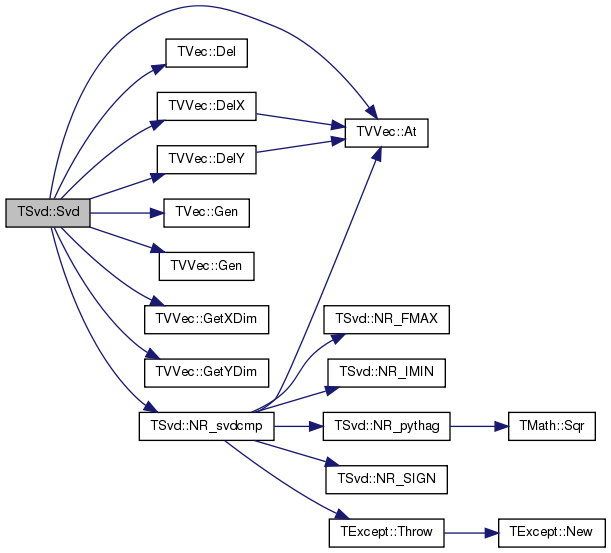

| void TSvd::Svd1Based | ( | const TFltVV & | InMtx1, |
| TFltVV & | LSingV, | ||
| TFltV & | SingValV, | ||
| TFltVV & | RSingV | ||
| ) | [static] |
Definition at line 1252 of file xmath.cpp.
References TVec< TVal, TSizeTy >::Del(), TVVec< TVal >::DelX(), TVVec< TVal >::DelY(), TVec< TVal, TSizeTy >::Gen(), TVVec< TVal >::Gen(), TVVec< TVal >::GetXDim(), TVVec< TVal >::GetYDim(), and NR_svdcmp().
Referenced by TSnap::GetSngVals(), and TSnap::GetSngVec().
{
LSingV = InMtx1;
SingValV.Gen(InMtx1.GetYDim());
RSingV.Gen(InMtx1.GetYDim(), InMtx1.GetYDim());
TSvd::NR_svdcmp(LSingV, InMtx1.GetXDim()-1, InMtx1.GetYDim()-1, SingValV, RSingV);
// 0-th singular value/vector is full of zeros, delete it
SingValV.Del(0);
LSingV.DelX(0); LSingV.DelY(0);
RSingV.DelX(0); RSingV.DelY(0);
}
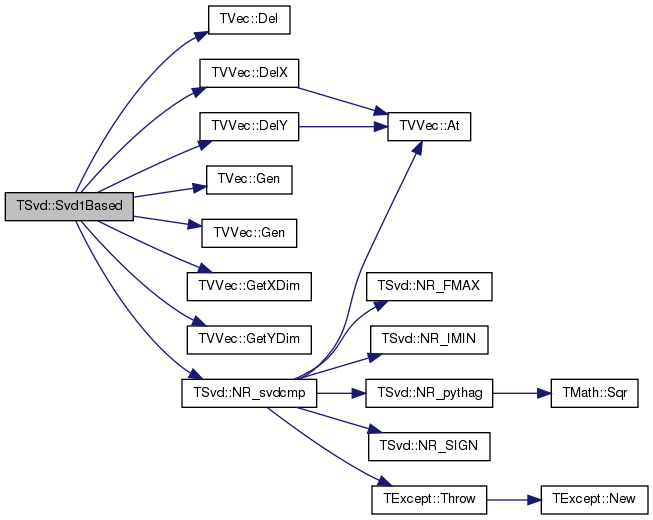
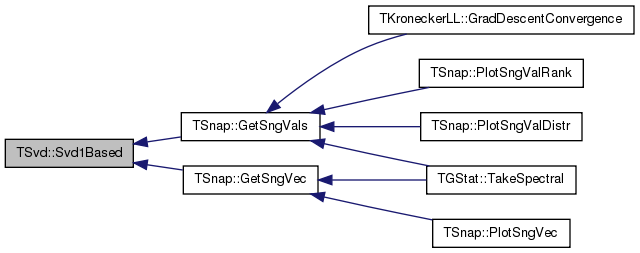
| void TSvd::Wr | ( | ) | const |
Definition at line 1263 of file xmath.cpp.
References GetCf(), GetCfUncer(), GetChiSq(), GetCovar(), and Vars.
{
printf("\n%11s %21s\n","parameter","uncertainty");
for (int i=0; i<Vars;i++){
printf(" a[%1d] = %8.6f %12.6f\n",
i+1, GetCf(i), GetCfUncer(i));
}
printf("chi-squared = %12f\n", GetChiSq());
printf("full covariance matrix\n");
{for (int i=0;i<Vars;i++){
for (int j=0;j<Vars;j++){
printf("%12f", GetCovar(i, j));}
printf("\n");
}}
}
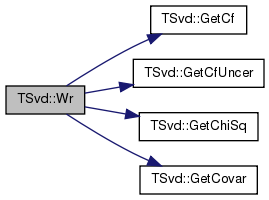
| double TSvd::ChiSq |
Definition at line 405 of file xmath.h.
Referenced by NR_svdfit().
Definition at line 403 of file xmath.h.
Referenced by NR_svdfit().
TCRef TSvd::CRef [private] |
| int TSvd::Recs |
Definition at line 402 of file xmath.h.
Referenced by NR_svdfit().
| int TSvd::Vars |
Definition at line 402 of file xmath.h.
Referenced by GetCfUncerV(), NR_svdfit(), and Wr().